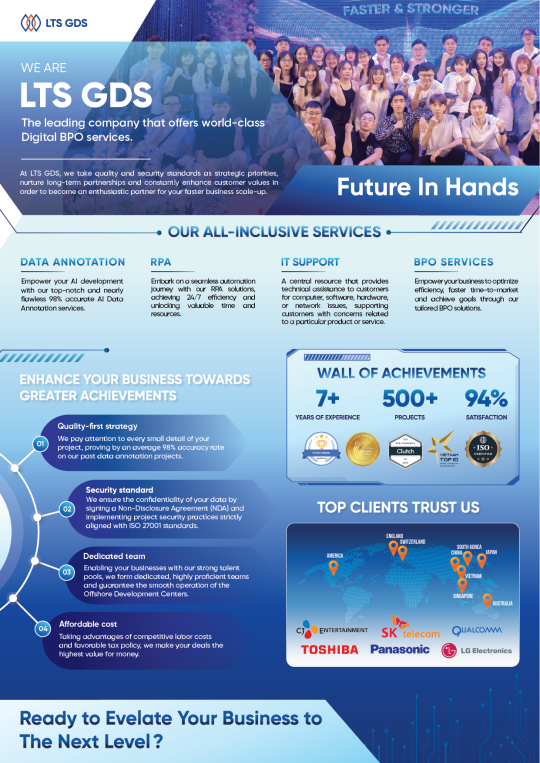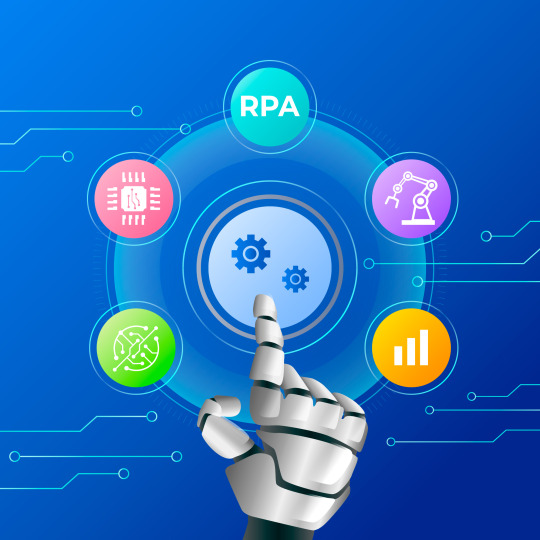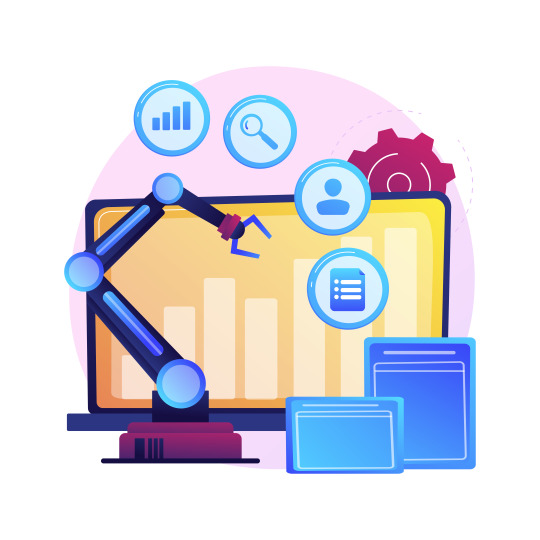#rpa companies
Explore tagged Tumblr posts
Text

Top Management's Toughest Decision: Manpower or Automation?
1 note
·
View note
Text

6 Reasons to Implement RPA Companies in Your Business
Time Savings: Automates repetitive tasks, freeing up time for more strategic activities. Error Reduction: Robot accuracy significantly decreases human errors. Increased Productivity: RPA allows employees to focus on higher-value tasks.
0 notes
Text
Benefits of Robotic Process Automation & Its Application RPA has benefited many industries in automating and aligning their work processes with their long-term goals. In this post, let us look at some of the benefits of RPA and its application in different industries.
0 notes
Text
Our IT Services

With more than 7 years of experience in the data annotation industry, LTS Global Digital Services has been honored to receive major domestic awards and trust from significant customers in the US, Germany, Korea, and Japan. Besides, having experienced hundreds of projects in different fields such as Automobile, Retail, Manufacturing, Construction, and Sports, our company confidently completes projects and ensures accuracy of up to 99.9%. This has also been confirmed by 97% of customers using the service.
If you are looking for an outsourcing company that meets the above criteria, contact LTS Global Digital Service for advice and trial!
2 notes
·
View notes
Text
Unlocking Efficiency and Innovation: The Role of Robotic Process Automation (RPA)

In today's fast-paced and competitive business environment, organizations are constantly seeking ways to improve efficiency, reduce costs, and increase productivity. Robotic Process Automation (RPA) has emerged as a powerful tool that can help businesses achieve these objectives.
What is Robotic Process Automation (RPA)?
Robotic Process Automation (RPA) is a technology that allows businesses to automate repetitive, rule-based tasks. It uses software robots, also known as "bots," to mimic human actions and interact with digital systems. These bots can log into applications, navigate through screens, input data, and complete tasks just like humans would.
The Role of RPA in Business:
RPA can be used to automate a wide range of tasks across various industries and departments. Here are some examples:
Finance and Accounting: Automating tasks such as accounts payable and receivable, invoice processing, and financial reporting.
Customer Service: Automating tasks such as answering FAQs, resolving customer inquiries, and processing orders.
Human Resources: Automating tasks such as onboarding new employees, processing payroll, and managing benefits.
IT: Automating tasks such as provisioning accounts, managing user access, and deploying software updates.
Impact of RPA on Businesses:
Implementing RPA can offer numerous benefits to businesses, including:
Increased efficiency and productivity: RPA can automate time-consuming and tedious tasks, freeing up employees to focus on more strategic and value-added activities.
Reduced costs: RPA can help businesses save money on labor costs, as well as reduce errors and compliance risks.
Improved accuracy and compliance: RPA bots are programmed to follow specific rules and procedures, which can help to improve accuracy and compliance with regulations.
Enhanced process visibility and control: RPA provides businesses with a clear view of their processes, which can help them identify and address bottlenecks.
Improved customer satisfaction: RPA can help businesses improve customer satisfaction by automating tasks such as order processing and customer service interactions.
RPA Services:
Implementing RPA successfully requires a partner with expertise in the technology and a deep understanding of business processes. A comprehensive RPA solution should include the following services:
Document AS-IS Process: This involves mapping out the existing process to identify areas for automation.
Design & Development of Bots, workflows, and forms for process automation: This includes designing and developing the software robots that will automate the tasks.
Bot license (We will use the appropriate underlying technology): This provides access to the software robots and the underlying technology platform.
Infrastructure: This includes setting up the necessary infrastructure to support the Robotic Process Automation (RPA) solution.
Production Deployment of the Bots: This involves deploying the bots to production and monitoring their performance.
RPA support: This includes ongoing support for the RPA solution, such as troubleshooting and maintenance.
Test & Deploy bots to production: This involves testing the bots in a production environment and making any necessary adjustments before they are deployed to full production.
Configuration data changes: This involves making changes to the configuration data of the bots as needed.
Password updates: This involves updating the passwords of the bots as needed.
Errors in executing the Bots: This involves resolving errors that occur during the execution of the bots.
Determining the “root cause” of a recurring issue or incident & recommendations: This involves identifying the root cause of a recurring issue or incident and recommending solutions to prevent it from happening again.
Infrastructure/application related issues: This involves resolving issues with the infrastructure or applications that the bots are interacting with.
Conclusion:
RPA is a powerful technology that can have a significant impact on businesses of all sizes. By automating repetitive tasks, RPA can help businesses improve efficiency, reduce costs, and increase productivity. However, it is important to choose a reputable Robotic Process Automation (RPA) companies with the expertise and experience to help you implement a successful RPA solution.
Ready to embrace the power of RPA?
Contact us today to learn more about how RPA can help your business achieve its goals.
#robotic process automation#robotic process automation rpa#rpa automation#robotic process automation software#rpa software#robotic process automation companies#robotic process automation technology#robotic process automation in healthcare#robotic process automation in banking#rpa solution#robotic process automation for finance#process automation solution#robotic process automation services#robotic process automation for insurance#rpa system#what is rpa automation#robotic process automation solution#robotic process automation benefits#robotic process automation consulting#robotic process automation consultant#rpa service provider#rpa consulting services
2 notes
·
View notes
Text
How does RPA Robotic Automation work for the travel industry?
Introductions
These days, it has become more important to use RPA (Robotic Automation Process) especially for travel agencies business operators business to flourish.
A few years ago, RPA (Robotic Automation Process) became one of the most popular software options in the travel and tourism sectors. Whereas it is the modern solution for modern technical issues.
RPA is that necessary software that every business operator has to opt for. There are some certain and variable reasons for which every business operator has to go for it. This software has enough capacity to hold and manage your entire business.
In the lower portion, we discuss the complete guide to RPA (Robotic Process Automation). You have to stay on this blog till the end.

What role does RPA play?
Let’s come to the point that RPA is the most essential part of every business to deal with trouble and mess. RPA stands for Robotic Automation, which is how it works. This software has some advanced functionality that can manage your entire business mess in a few easy steps without any human interference. RPA (Robotic Process Automation) has versatile benefits.
Which Company RPA is better to choose?
SoftwareXprts RPA Service Provider (Robotic Process Automation) has amazing features and performing functionality, which can be very favorable for online travel agencies and tour operators. where there has always been a messy workload.
With the aid of RPA, business operators can manage all their work within a few clicks. This software will reduce face-to-face interactions and also reduce the workload.
Which types of Services RPA Provides?
RPA is robotic process automation that enhances and has the capability to manage your entire business with the help of this RPA Service Provider. You can take care of your business 24/7. Also, you can earn a valuable response from the RPA.
Here is the list of the facility that RPA Provides:-
You can earn a long queue of digital customers via this RPA software. RPA has the ability to automate your business's performance. Whereas, with the help of the scenarios you’re booking, it will become easier. Through the aid of this RPA Software, you will get notified of every notification of booking which is done by the Customer for the booking purpose.
Features of the RPA (Robotic Process Automation)
Our Automated and digital software is available as cloud services and Amadeus. Any Travel Platform Queue Management Remove HX Segments Check Airline Comments Check Schedule Changes Low –Fare finder-Post booking (24 hours of Window). It Basis on remarks set in PNR Data scrapping bots Convenient & Reliable functions
What is the benefit for travel industry operators to use this RPA software?
A fast ROI via the help of this software. And convenient access. It can maximize your stress of handling the work, RPA is online. It increases your productivity in your business. You will get notified about every notification from the client.
Demo Version
SoftwareXprts has also introduced demo editions of the RPA software, so now customers can freely perpetuate each and every single functionality and feature of our RPA software. Therefore, our software has a very user-friendly interface that can be operated by a novice as well. Hence, our demo edition is completely free, so our prestigious customers can evaluate all its functions.
Conclusions
Now we are ending this blog with a conclusion, submitting all the information in a small end up. This RPA is a good solution for travel and tour operators who have their travel businesses online. We have completed this blog with plenty of information about our RPA software, so you will not have any difficulty evaluating our services. According to today’s technical issues, which are faced by the travel agencies regularly for various purposes?
We hope that you will appropriately understand what we are trying to say about our software. We aim to help every travel and tour operator escalate their business with the help of our RPA software.
#RPA#RPA service provider#SoftwareXprts#best travel technology company#best travel portal development company#travel booking software#online ticket booking system#travel mid office solutions
2 notes
·
View notes
Text
Explore the top product development companies in the USA for 2024 and beyond with Upcore Tech’s comprehensive guide. Whether you're looking to develop a new product from scratch or enhance an existing one, this list features the leading firms with expertise in innovation, design, and technology. Learn about their services, industry experience, and how they can help you bring your ideas to life with cutting-edge solutions that meet market demands. Stay ahead of the competition by partnering with the best in the business!
#digital experience company#product development services#AI Solutions#ai consulting#generative ai company#machine learning services#RPA Solutions#chatbot development services#digital transformation solutions#ecommerce development services#IT Staff Augmentation
0 notes
Text

#RPA#Intelligent Automation#Automation Services#Automation Company#Dubai#centelli#UAE#Hire RPA#Robotic Process Automation
0 notes
Text
Top Robotic Process Automation Service Providers Revolutionising Business Efficiency

In today’s competitive landscape, organisations are constantly seeking ways to improve efficiency, reduce operational costs, and enhance overall productivity. One of the most impactful solutions in this regard is Robotic Process Automation (RPA). With its ability to automate repetitive tasks, streamline processes, and minimise human error, RPA has become a critical tool for modern businesses. In this article, we delve into the top robotic process automation service providers who are transforming the way businesses operate and driving unparalleled efficiency.
The Importance of Robotic Process Automation
Before exploring the service providers, it’s essential to understand why RPA has become a cornerstone for businesses aiming to stay ahead in their respective industries:
Enhanced Productivity: By automating routine tasks, RPA frees up human resources to focus on high-value, strategic activities. Employees can dedicate more time to creative and analytical work, driving innovation and growth.
Cost Savings: Automated processes significantly reduce labour costs and improve the overall cost-efficiency of operations. This reduction allows businesses to allocate resources more effectively, improving profitability.
Error Reduction: With consistent and rule-based execution, RPA minimises errors associated with manual tasks. This ensures higher accuracy in critical operations like data entry, reporting, and compliance checks.
Scalability: RPA solutions can easily scale to accommodate the growing needs of a business, making them a flexible choice for organisations of all sizes. From startups to multinational corporations, scalability ensures sustainability.
Improved Compliance: Automated systems ensure adherence to regulations and standards, reducing compliance risks. With comprehensive audit trails, organisations can easily verify and document processes.
Characteristics of Leading Robotic Process Automation Service Providers
Top robotic process automation service providers share common characteristics that set them apart. When selecting a provider, businesses should look for the following qualities:
Customisation Capabilities: The best providers tailor solutions to fit the unique needs of their clients. They prioritise understanding specific business challenges and delivering bespoke systems.
Comprehensive Support: A robust support system ensures smooth implementation and ongoing maintenance of RPA systems. This includes updates, troubleshooting, and staff training.
Advanced Technology: Providers leveraging cutting-edge AI and machine learning technologies deliver superior automation solutions. This ensures businesses remain competitive in an increasingly digital world.
Industry Expertise: Extensive knowledge of specific industries allows providers to design solutions that align with business goals. From retail to healthcare, industry expertise ensures targeted outcomes.
Proven Track Record: A track record of client satisfaction and successful implementation is a reliable indicator. Case studies and client testimonials often reflect the provider’s effectiveness.
Benefits Offered by Robotic Process Automation Service Providers
Choosing the right provider can have transformative effects on a business. Here are some key benefits of working with top RPA providers:
Faster Time-to-Market: Automated processes accelerate operations, enabling businesses to deliver products and services more quickly. This flexibility has the potential to revolutionise businesses that move quickly.
Increased Operational Efficiency: By streamlining workflows, providers help eliminate bottlenecks and redundancies. Businesses experience smoother processes and optimised resource use.
Enhanced Customer Experience: Faster, error-free operations lead to improved customer satisfaction. Automated customer interactions ensure consistency and responsiveness.
Data Insights: Many RPA tools come with analytics features, offering valuable insights into business processes. This data can guide strategic decisions and uncover new opportunities.
Flexibility Across Sectors: From healthcare to finance, RPA solutions are adaptable to a wide range of industries. Providers often specialise in addressing sector-specific pain points.
Key Applications of RPA Across Industries
Robotic process automation service providers cater to diverse industries by addressing specific pain points and delivering bespoke solutions. Below are some notable applications:
Finance and Accounting
Automating invoice processing and accounts reconciliation, reducing the time and effort required.
Streamlining financial reporting and auditing tasks to ensure compliance and accuracy.
Human Resources
Simplifying employee onboarding and payroll management, enhancing efficiency and employee satisfaction.
Automating compliance reporting and performance reviews, allowing HR teams to focus on strategic initiatives.
Customer Service
Enhancing query resolution through automated responses, reducing response times and improving customer satisfaction.
Reducing wait times with intelligent chatbots that handle routine inquiries and escalate complex issues.
Healthcare
Managing patient data and appointment scheduling, improving operational efficiency in clinics and hospitals.
Ensuring accurate claims processing and billing, reducing administrative overheads and errors.
Retail
Streamlining inventory management and supply chain operations, ensuring timely restocking and efficient logistics.
Enhancing personalised marketing efforts with data automation, leading to better customer targeting and increased sales.
Tips for Choosing the Right RPA Service Provider
Selecting the ideal robotic process automation service provider can be a daunting task. The following useful advice will help to streamline the decision-making process:
Assess Your Needs: Clearly define the processes you want to automate and your desired outcomes. Understanding your objectives will help you evaluate potential providers effectively.
Evaluate Expertise: Look for providers with experience in your industry and a strong understanding of your business challenges. This ensures they can deliver solutions that meet your unique requirements.
Check Integration Capabilities: Ensure the provider’s solutions integrate seamlessly with your existing systems. Compatibility is crucial for smooth operations and minimal disruptions.
Consider Scalability: Choose a provider with scalable solutions to support future growth. This ensures your investment remains valuable as your business evolves.
Request Case Studies: Reviewing past projects can provide insights into the provider’s capabilities and success rates. This also highlights their ability to meet deadlines and deliver quality results.
Emerging Trends in RPA
The field of RPA is continuously evolving, with new trends shaping the way robotic process automation service providers deliver their solutions. Among the most noteworthy trends are:
Hyperautomation: Combining RPA with AI, machine learning, and analytics for a more holistic approach to automation. This trend aims to tackle complex processes that require advanced decision-making capabilities.
Cognitive Automation: Introducing AI-driven bots capable of handling unstructured data and making decisions. This allows for more sophisticated automation in areas like customer service and fraud detection.
Cloud-Based RPA: Leveraging cloud platforms for greater flexibility and cost-effectiveness. Cloud-based solutions provide easier access, reduced infrastructure costs, and enhanced scalability.
Integration with IoT: Using RPA to manage IoT-enabled devices and systems. For sectors like manufacturing and logistics, this tendency is especially pertinent.
Focus on Security: Enhancing security protocols to protect sensitive data handled by automated systems. Information security is critical as automation grows in popularity.
The Future of RPA in Business
As organisations continue to embrace digital transformation, the role of robotic process automation service providers will become even more significant. The following forecasts are for the future:
Wider Adoption Across SMEs: More small and medium-sized enterprises will adopt RPA to compete with larger firms. Accessible and affordable solutions will drive this trend.
Greater Personalisation: Providers will focus on creating highly tailored solutions to meet individual business needs. This will guarantee optimal efficacy and relevance.
Integration with Emerging Technologies: RPA will work alongside technologies like blockchain, AI, and quantum computing for more advanced applications. This integration will open up new automation opportunities.
Focus on Sustainability: Automation will be leveraged to support eco-friendly initiatives and reduce waste. Businesses will prioritise sustainable practices through smarter resource management.
Enhanced Workforce Collaboration: The integration of human and digital workforces will create a harmonious and productive environment. Employees will work alongside bots to achieve higher efficiency.
Conclusion
Robotic process automation service providers play a pivotal role in revolutionising business efficiency by offering innovative solutions that address critical operational challenges. By choosing the right provider, businesses can unlock new levels of productivity, streamline workflows, and stay competitive in an ever-evolving market. As the RPA landscape continues to advance, the possibilities for innovation and growth are boundless, making it an exciting time for organisations to embrace automation and reap its numerous benefits.
In the years to come, businesses that prioritise automation will lead their industries, achieving unparalleled success and setting benchmarks for operational excellence. Whether it’s through enhanced customer experiences, reduced costs, or sustainable practices, RPA is shaping the future of work, making it an indispensable tool for modern enterprises.
#robotic process automation service providers#rpa solutions#robotic process automation tools#rpa automation tools#robotic process automation companies#robotic process automation solutions#robotic process automation companies in india#rpa service providers#robotic automation companies#robotic process automation vendors#rpa solution provider#top robotic process automation companies#top rpa service providers#rpa providers
0 notes
Text
AI automation & RPA solutions for enhanced productivity
Zionit offers AI automation and RPA services to streamline workflows, manage software assets, and verify documents—all while cutting costs.
#AI automation and RPA services#"AI Product Companies#Dynamic AI Agents#Intelligent agents in ai#Live chat software for websites
0 notes
Text
AI automation & RPA solutions for enhanced productivity
Zionit offers AI automation and RPA services to streamline workflows, manage software assets, and verify documents—all while cutting costs
#AI Product Companies#Business Automation Tool#AI automation and RPA services#Dynamic AI Agents#Intelligent agents in ai#Live chat software for websites
0 notes
Text
RPA Service Providers India: Driving Automation Transformation
Automate your business process to boost productivity with Ess India RPA Solutions. Read 50+ Industry Specific RPA Use Cases. Get a Free Consultation call Today!

Explore the top RPA service providers in India. Experience seamless automation implementation and drive business growth.
#RPA solutions#rpa service provider#RPA service providers#rpa services company#rpa solution provider#RPA company#RPA companies#RPA Solutions Provider#RPA solutions India#RPA service providers India#RPA service providers in India#RPA services company#RPA solution provider#RPA solution providers#RPA company in India#RPA companies in India#Top RPA Companies in India
0 notes
Text
robotic process automation company
Robotic Process Automation Services offer businesses the ability to automate repetitive and time-consuming tasks, significantly improving efficiency and reducing operational costs. RPA utilizes software robots, or "bots," to mimic human actions and interact with digital systems to execute business processes quickly and accurately. These services can be applied across various functions, including data entry, invoice processing, customer service, HR tasks, and more. By automating routine activities, RPA frees up employees to focus on higher-value tasks, enhancing productivity and job satisfaction. Furthermore, Custom RPA solutions are scalable and can be customized to fit the specific needs of an organization, ensuring seamless integration with existing systems. The implementation of RPA not only accelerates process execution but also minimizes errors, ensuring compliance and consistency. As a result, businesses can achieve faster turnaround times, improved service delivery, and a stronger competitive edge in their respective markets.
An RPA development company specializes in creating, implementing, and managing automation solutions that streamline business processes. These companies leverage advanced RPA tools and technologies to design software robots capable of performing repetitive tasks with high efficiency and precision.
A Robotic Process Development Company specializes in designing and implementing automation solutions that streamline and optimize business processes through advanced robotic technologies. These companies focus on developing software robots or "bots" that automate repetitive, rule-based tasks, enabling organizations to improve efficiency and reduce manual effort. Evaluating existing business processes to identify opportunities for automation and developing a tailored strategy for implementing robotic solutions. Deploying and integrating robotic solutions into the business environment, ensuring smooth operation and minimal disruption to existing processes.
0 notes
Text
All You Need to Know about Robotic Process Automation If users encounter any challenges while using RPA, they can also opt for short-term on-site trainings to help them acquire the essential skills for effectively utilising the RPA development platform.
0 notes
Text
Robotic Desktop Automation: Everything You Should Know
In today’s rapidly evolving technological landscape, businesses are constantly seeking innovative ways to enhance efficiency and reduce operational costs. Robotic Desktop Automation (RDA) has emerged as a game-changer, offering numerous benefits for companies looking to streamline their processes.
This comprehensive guide will delve into everything you need to know about RDA, highlighting key aspects, benefits, and considerations for choosing the right RPA Service Company.
0 notes
Text
Enhance efficiency and productivity by implementing tailored Robotic Process Automation (RPA) solutions, designed specifically to meet your business needs. More info: https://www.linkedin.com/pulse/building-smarter-businesses-custom-rpa-solutions-amyra-sheldon-6rf4c/ #rpasolutions #rpadevelopmentcompany #rpadevelopment #rpa #roboticsprocessautomation #automation #Solution #development #TechSolutions
#rpa development company#rpa#rpa solutions#rpa development#robotics process automation#tech solutions#tech innovation
0 notes